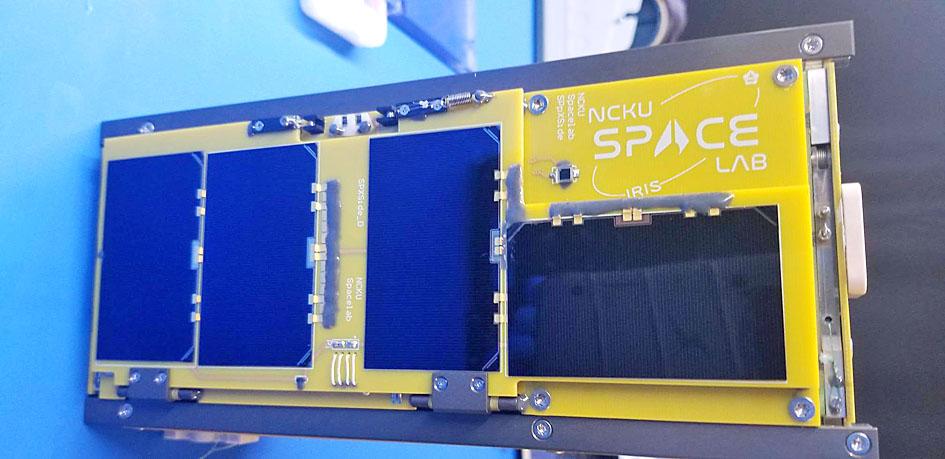Two Taiwanese space technology products developed by National Cheng Kung University (NCKU) and start-up Tensor Tech Co were yesterday launched by a SpaceX Falcon 9 rocket from Florida in a joint mission.
The Transporter-3 mission launched at 10:25am on Thursday at Cape Canaveral Space Force Station in Florida. The program put 105 small satellites into a sun-synchronous orbit at an altitude of 525km, NASASpaceflight.com says.
Among them was a cubesat — a small research satellite — named Iris-A, developed by NCKU electrical engineering professor Juang Jyh-ching (莊智清).

Photo courtesy of NCKU professor Juang Jyh-ching
Juang said that his team has received data transmitted by the cubesat via a ground station at the university’s campus in Tainan’s Gueiren District (歸仁).
The cubesat consists of a camera developed by Liscotech System Co, a long-range receiver by Letscom International Ltd, a GPS receiver by the National Space Organization (NSPO) and a reference clock by NCKU, according to Juang’s Space Lab Web site.
The GPS receiver in the cubesat is a miniaturized test model of what is to be used in NSPO Triton and Formosat-8 satellites to be launched at later dates, Juang said.
The cubesat is tasked with demonstrating Internet of Things (IoT) technology, including communication experiments using long-range delay tolerant network and Doppler compensation experiments, as well as testing the camera’s imaging capability, he said.
Iris-A is the first of a cubesat series, with Iris-B and Iris-C set to be launched at the end of this year or later, Juang said.
The launch mission also involves a novel attitude determination and control system (ADCS) developed by Tensor Tech, installed on Polish firm SatRevolution’s cubesat named Stork-1.
“This ADCS is actuated using a spherical motor with a rotor that can spin on multiple axes,” Tensor Tech said in a statement.
Conventional ADCS systems use three motors on three axes to rotate a satellite to a desired position, while Tensor Tech refined the functioning to one spherical motor to minimize the satellite’s weight, volume and power consumption, it said.
Stork-1 was designed to last three years, although its lifespan would be affected by a number of factors, said Tensor Tech cofounder and CEO Thomas Yen (顏伯勳).
The company is seeking clients in the US, Europe, Japan and India, and has discussed possible cooperation opportunities with local universities, Yen said.
Most Taiwanese businesses in the space-tech supply chain serve as OEM suppliers or satellite component producers, while the company aims to develop satellite subsystems or services to expand its market scope, he said.
The company could face challenges if it attempts to install the system on larger satellites, industry experts have said.
While the logic for controlling different satellites is the same, Tensor Tech will have to redesign the ADCS for larger satellites, which is one of the company’s goals, Yen said.
Founded in 2019, Tensor Tech branched from the laboratory of NCKU electrical engineering professor Hsieh Min-fu (謝旻甫), Yen said, adding that local electronics firms are its main investors.
The company has six full-time employees and two part-time workers, said 21-year-old Yen, who suspended his studies during his first year at National Taiwan University.

Taiwan has received more than US$70 million in royalties as of the end of last year from developing the F-16V jet as countries worldwide purchase or upgrade to this popular model, government and military officials said on Saturday. Taiwan funded the development of the F-16V jet and ended up the sole investor as other countries withdrew from the program. Now the F-16V is increasingly popular and countries must pay Taiwan a percentage in royalties when they purchase new F-16V aircraft or upgrade older F-16 models. The next five years are expected to be the peak for these royalties, with Taiwan potentially earning

STAY IN YOUR LANE: As the US and Israel attack Iran, the ministry has warned China not to overstep by including Taiwanese citizens in its evacuation orders The Ministry of Foreign Affairs (MOFA) yesterday rebuked a statement by China’s embassy in Israel that it would evacuate Taiwanese holders of Chinese travel documents from Israel amid the latter’s escalating conflict with Iran. Tensions have risen across the Middle East in the wake of US and Israeli airstrikes on Iran beginning Saturday. China subsequently issued an evacuation notice for its citizens. In a news release, the Chinese embassy in Israel said holders of “Taiwan compatriot permits (台胞證)” issued to Taiwanese nationals by Chinese authorities for travel to China — could register for evacuation to Egypt. In Taipei, the ministry yesterday said Taiwan

Taiwan is awaiting official notification from the US regarding the status of the Agreement on Reciprocal Trade (ART) after the US Supreme Court ruled US President Donald Trump's global tariffs unconstitutional. Speaking to reporters before a legislative hearing today, Premier Cho Jung-tai (卓榮泰) said that Taiwan's negotiation team remains focused on ensuring that the bilateral trade deal remains intact despite the legal challenge to Trump's tariff policy. "The US has pledged to notify its trade partners once the subsequent administrative and legal processes are finalized, and that certainly includes Taiwan," Cho said when asked about opposition parties’ doubts that the ART was

If China chose to invade Taiwan tomorrow, it would only have to sever three undersea fiber-optic cable clusters to cause a data blackout, Jason Hsu (許毓仁), a senior fellow at the Hudson Institute and former Chinese Nationalist Party (KMT) legislator, told a US security panel yesterday. In a Taiwan contingency, cable disruption would be one of the earliest preinvasion actions and the signal that escalation had begun, he said, adding that Taiwan’s current cable repair capabilities are insufficient. The US-China Economic and Security Review Commission (USCC) yesterday held a hearing on US-China Competition Under the Sea, with Hsu speaking on